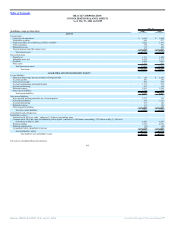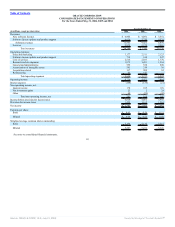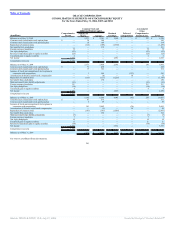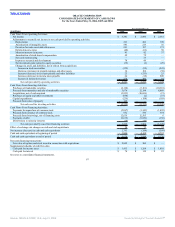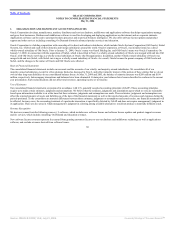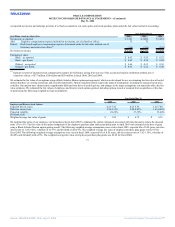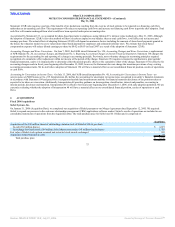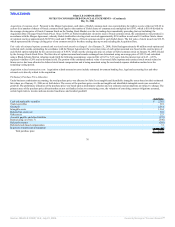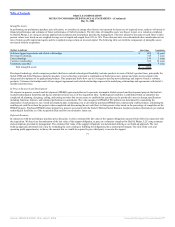Oracle 2005 Annual Report Download - page 73
Download and view the complete annual report
Please find page 73 of the 2005 Oracle annual report below. You can navigate through the pages in the report by either clicking on the pages listed below, or by using the keyword search tool below to find specific information within the annual report.
Table of Contents
ORACLE CORPORATION
NOTES TO CONSOLIDATED FINANCIAL STATEMENTS—(Continued)
May 31, 2006
We defer revenue for any undelivered elements, and recognize revenue when the product is delivered or over the period in which the service is performed, in
accordance with our revenue recognition policy for such element. If we cannot objectively determine the fair value of any undelivered element included in
bundled software and service arrangements, we defer revenue until all elements are delivered and services have been performed, or until fair value can
objectively be determined for any remaining undelivered elements. When the fair value of a delivered element has not been established, we use the residual
method to record revenue if the fair value of all undelivered elements is determinable. Under the residual method, the fair value of the undelivered elements is
deferred and the remaining portion of the arrangement fee is allocated to the delivered elements and is recognized as revenue.
Our software license arrangements generally do not include acceptance provisions. However, if acceptance provisions exist as part of public policy, for example
in agreements with government entities when acceptance periods are required by law, or within previously executed terms and conditions that are referenced in
the current agreement and are short-term in nature, we provide for a sales return allowance in accordance with Financial Accounting Standards Board Statement
No. 48, Revenue Recognition when Right of Return Exists. If acceptance provisions are long-term in nature or are not included as standard terms of an
arrangement or if we cannot reasonably estimate the incidence of returns, revenue is recognized upon the earlier of receipt of written customer acceptance or
expiration of the acceptance period.
We also evaluate arrangements with governmental entities containing “fiscal funding” or “termination for convenience” provisions, when such provisions are
required by law, to determine the probability of possible cancellation. We consider multiple factors, including the history with the customer in similar
transactions, the “essential use” of the software licenses and the planning, budgeting and approval processes undertaken by the governmental entity. If we
determine that the likelihood of non-acceptance in these arrangements is remote, we then recognize revenue once all of the criteria described above have been
met. If such a determination cannot be made, revenue is recognized upon the earlier of cash receipt or approval of the applicable funding provision by the
governmental entity.
We assess whether fees are fixed or determinable at the time of sale and recognize revenue if all other revenue recognition requirements are met. Our standard
payment terms are net 30; however, terms may vary based on the country in which the agreement is executed. Payments that are due within six months are
generally deemed to be fixed or determinable based on our successful collection history on such arrangements, and thereby satisfy the required criteria for
revenue recognition.
While most of our arrangements include short-term payment terms, we have a standard practice of providing long-term financing to credit worthy customers
through our financing division. We have established a history of collection, without concessions, on these receivables with payment terms that generally extend
up to five years from the contract date. Provided all other revenue recognition criteria have been met, we recognize new software license revenue for these
arrangements upon delivery, net of any payment discounts from financing transactions. In fiscal 2006, 2005 and 2004, $618 million, $456 million and $357
million or approximately 13%, 11% and 10% of our new software license revenues were financed through our financing division. We have generally sold these
receivables on a non-recourse basis to third party financing institutions. We account for the sale of these receivables as “true sales” as defined in FASB Statement
No. 140, Accounting for Transfers and Servicing of Financial Assets and Extinguishments of Liabilities.
Allowances for Doubtful Accounts and Returns
We record allowances for doubtful accounts based upon a specific review of all significant outstanding invoices. For those invoices not specifically reviewed,
provisions are provided at differing rates, based upon the age of the
70
Source: ORACLE CORP, 10-K, July 21, 2006 Powered by Morningstar® Document Research℠






